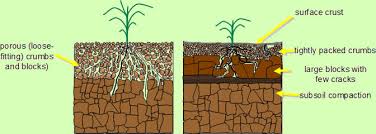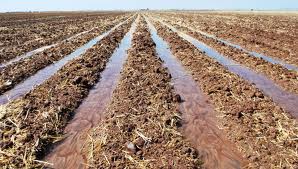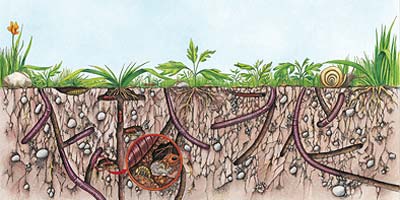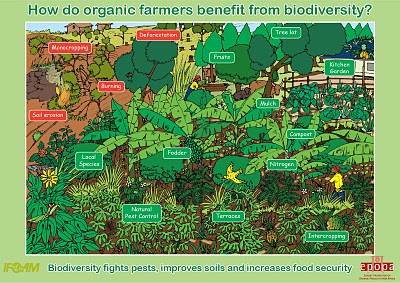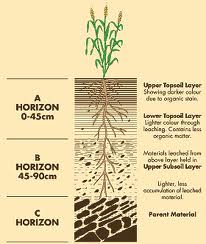This is the first of a series of posts on why the way we grow our food is more important than labels like “organic”, “local”, or “natural”.
Growing food ecologically is more than simply not using pesticides, herbicides, insecticides, artificial fertilizers, and GMO’s. It’s a wholistic system that takes into account soil health, natural fertility, pollinators, beneficial insects, companion planting, the significance of weeds, birds and other animals, clean water, and more. Without healthy soil we cannot grow healthy food as plants can only take up nutrients found in the soil.
From Wikipedia: “Since soil has a tremendous range of available niches and habitats, it contains most of the earth’s genetic diversity. A handful of soil can contain billions of organisms, belonging to thousands of species.” These beneficial microbes live in compost and in fertile soil and do all the heavy lifting that makes it possible for our food to grow and to be nutritious.
When we disturb the soil with practices such as tilling we destroy the balance of these creatures and their ability to decompose and create fertile soil. Large scale producers must add fossil fuel based artificial fertilizers in order to keep growing food because the soil has been rendered infertile. Most organic farmers employ extensive tilling without considering that they are disturbing this precious balance while also creating a hardpan and compaction that weakens a plants roots and its ability to grow over the long term.
Very few farmers employ permanent raised beds and compact their growing area every year. Other benefits to raised beds include: less weeding, soil that warms up more quickly in spring, efficient irrigation + drainage, reduced need for compost + mulch, growing more food in less space, and more.
Tilling also kills the worms working so hard to make our soil more fertile and aerated. From Wikipedia: “Earthworm activity aerates and mixes the soil, and is conducive to mineralization of nutrients and uptake of them by vegetation. Certain species of earthworm come to the surface and graze on the higher concentrations of organic matter present there, mixing it with the mineral soil. Because a high level of organic matter mixing is associated with soil fertility, an abundance of earthworms is generally considered beneficial by the organic gardener. Plant roots depend on the process of respiration, and on soil ventilation, which can be accomplished via networks of soil pores and by the tunnels created by earthworms.” As an ecological farmer, it’s important to me that this balance is kept, not destroyed.
A wealth of information can be found here: http://www.soilandhealth.org/01aglibrary/010117attrasoilmanual/010117attra.html – lots of great resources on soil and microbes and earthworms
Tilling and ploughing were used a century ago because they gave a very short term shot of nitrogen to plants and appeared to make plants larger and more abundant. This effect wears off after a couple of years.
Tilling brings up weed seeds every time and the task of weeding – the bane of an organic farmers existence – is made more and more difficult every year, and it never ends.
Topsoil capable of growing food and supporting us is disappearing at an alarming rate every year and it takes 800 to 1000 years for a 2.5 cm thick layer of fertile soil to be formed in nature. We must work to protect this this topsoil. We can use different ways to manage our soils.
Permaculture is the only system that has the preservation of soil – and all it’s creatures – at it’s core.
At our farm we use cover crops – plants with fibrous roots – and chop them manually to add the plant matter back to the soil as mulch while creating organic matter. Cover crops are also useful as a living mulch – feeding microbes, keeping the soil moist, keeping weeds under control. Micro-organisms, including fungi and bacteria, affect chemical exchanges between roots and soil and act as a reserve of nutrients. Dead plants and fallen leaves and stems begin their decomposition on the surface. There, soil organisms feed on them, mixing the organic material with the upper soil layers; these added organic compounds become part of the soil formation process. Humans impact soil formation by removing vegetation cover, resulting in erosion and loss of organic matter.
We can help speed up the process of creating organic matter and topsoil not with tilling but by adding new materials throughout the season, with sheet mulching, trench mulching, or lasagne gardening. Burying whole or pieces of fish is another old practice. We enrich the soil with finished compost, vermicompost, and composted animal manures, creating our own sped-up organic matter and topsoil.
No-till, or no-dig, gardening works well in both small and large-scale gardens. It can improve soils that are hard to manage, such as the clay we have at the Tilbury farm. By combining techniques from Permaculture, Biologically Intensive, French Intensive, Hugelkultur, Raised Bed Gardening, Square-Foot Gardening, Ecological Gardening, Small-Scale Garden Marketing, and Eliot Coleman we can improve and make more productive any soil type. This works especially well with our clay soil.
Clay holds water well in a drought, has many more minerals, but creates a hardpan easily and is difficult to manage when wet. Sand doesn’t hold water thus needing constant irrigation, is low in nutrition, leaching minerals, and needs constant fertilization but it makes a darn fine seed bed.
Next Installment: The Pros and Cons of Raised Beds
